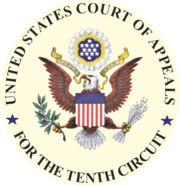| Doe v. Shurtleff | |
|---|---|
 | |
| Court | United States Court of Appeals for the Tenth Circuit |
| Full case name | John Doe v. Mark Shurtleff |
| Decided | October 26 2010 |
| Citation | 628 F.3d 1217 (10th Cir. 2010) |
| Holding | |
| Affirmed District Court decision. Utah Code Ann. § 77-27-21.5, a Utah statute requiring convicted sex offenders to register their online identifiers, does not violate the First or Fourth Amendments or the Ex Post Facto Clause. | |
| Court membership | |
| Judges sitting | Neil M. Gorsuch, Monroe G. McKay, Richard D. Cudahy |
| Case opinions | |
| Majority | Monroe G. McKay |
| Laws applied | |
| Utah Code Ann. § 77-27-21.5, Federal Rule of Civil Procedure 60(b), First Amendment, Fourth Amendment, Ex Post Facto Clause | |
Doe v. Shurtleff, 628 F.3d 1217 (10th Cir. 2010), was a United States Court of Appeals for the Tenth Circuit case assessing the constitutionality of Utah Code Ann. § 77-27-21.5, a law that requires sex offenders to register their internet identifiers with the state in order to "assist in investigating kidnapping and sex-related crimes, and in apprehending offenders."[1][2] In this case, a convicted sex offender, appearing anonymously as John Doe, appealed a decision Archived January 4, 2014, at the Wayback Machine by the United States District Court for the District of Utah to vacate an order enjoining the enforcement of Utah Code Ann. § 77-27-21.5. Even though Doe did not dispute the state's interest in enacting such a statute, he believed that the statute's enforcement ran afoul of his:
- First Amendment right to engage in anonymous speech;
- Fourth Amendment rights to privacy and freedom from unreasonable search and seizure; and
- the Ex Post Facto Clause of the Constitution.
Upon examining Doe's appeal, the Tenth Circuit determined that Utah's registration statute did not violate Doe's First or Fourth Amendment rights or the Ex Post Facto Clause, and therefore affirmed the lower court's decision to lift the injunction.[1]
- ^ a b Cite error: The named reference
courtopwas invoked but never defined (see the help page). - ^ Utah Code Ann. § 77-27-21.5 Archived December 28, 2011, at the Wayback Machine